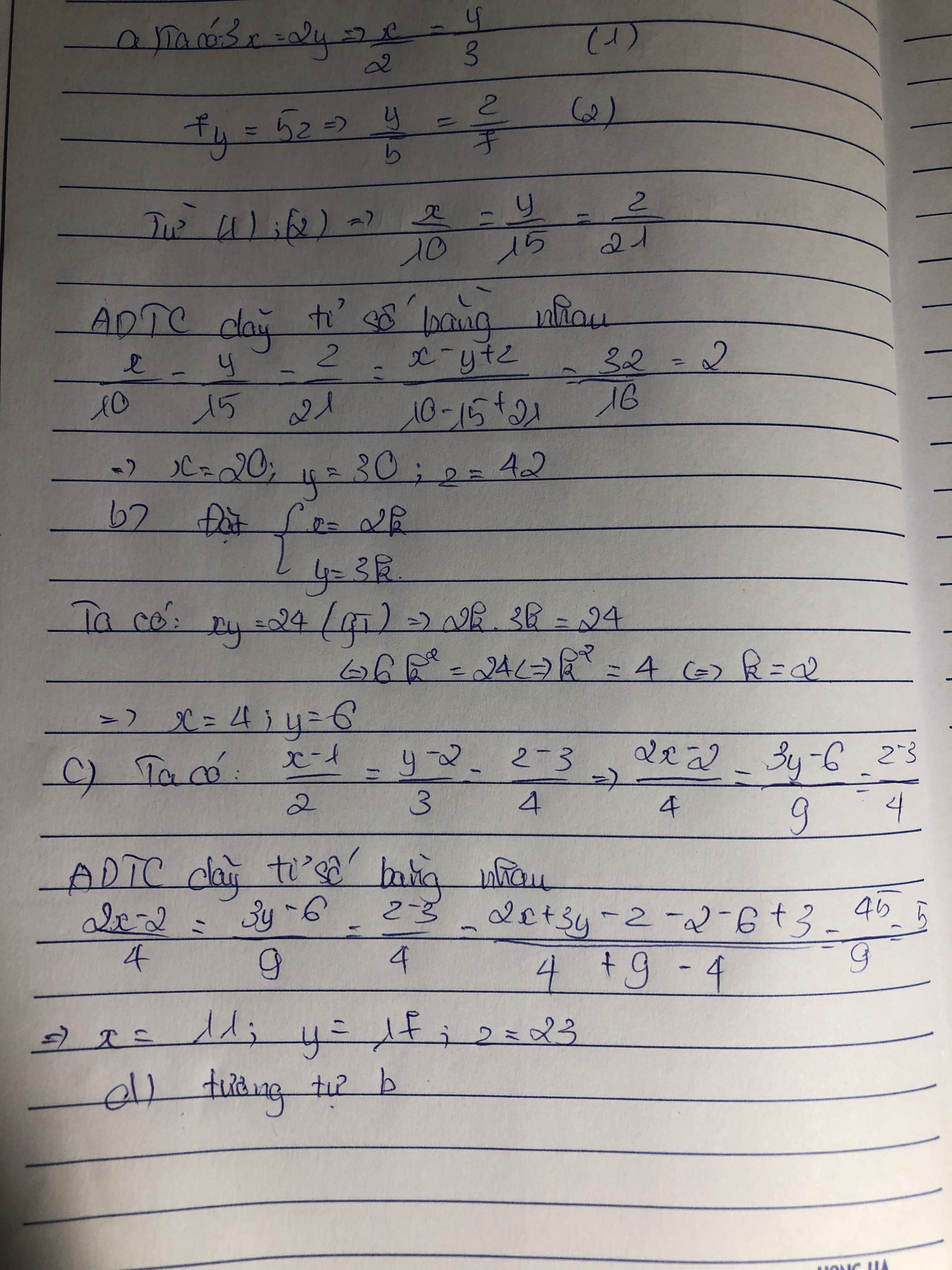\(\dfrac{7y+1}{y-5}\)+\(\dfrac{2}{y-5}\)
Hãy nhập câu hỏi của bạn vào đây, nếu là tài khoản VIP, bạn sẽ được ưu tiên trả lời.


a:\(A=5:\dfrac{1}{2}+\dfrac{20}{5}+1:\dfrac{-1}{4}=10+4-4=10\)
b: y/x=1/4
nên x=4y
\(A=\dfrac{4x+7y}{x-3y}=\dfrac{16y+7y}{4y-3y}=23\)

Lời giải:
Đặt $\frac{3x-1}{4}=\frac{7y-4}{5}=t\Rightarrow x=\frac{4t+1}{3}; y=\frac{5t+4}{7}$
Khi đó:
$t=\frac{3x+7y-5}{3x}=\frac{4t+1+(5t+4)-5}{4t+1}$
$\Rightarrow t=\frac{9t}{4t+1}$
$\Rightarrow t(4t+1)=9t$
$\Rightarrow t(4t+1-9)=0$
$\Rightarrow t(4t-8)=0$
$\Rightarrow t=0$ hoặc $t=2$
Đến đây bạn thay vào tìm x,y thôi.

4: Áp dụng tính chất của dãy tỉ số bằng nhau, ta được:
\(\dfrac{x}{8}=\dfrac{y}{12}=\dfrac{z}{15}=\dfrac{x-y-z}{8-12-15}=\dfrac{38}{-19}=-2\)
Do đó: x=-16; y=-24; z=-30

\(2x=3y\text{⇒}\dfrac{x}{3}=\dfrac{y}{2}\text{⇒}\dfrac{x}{21}=\dfrac{y}{14}\)
\(5y=7z\text{⇒}\dfrac{y}{7}=\dfrac{z}{5}\text{⇒}\dfrac{y}{14}=\dfrac{z}{10}\)
⇒\(\dfrac{x}{21}=\dfrac{y}{14}=\dfrac{z}{10}\)⇒\(\dfrac{3x}{63}=\dfrac{7y}{98}=\dfrac{5z}{50}\)
Áp dụng tính chất dãy tỉ số bằng nhau, ta có:
\(\dfrac{3x}{63}=\dfrac{7y}{98}=\dfrac{5z}{50}=\dfrac{3x-7y+5z}{63-98+50}=\dfrac{30}{15}=2\)
⇒x=42,y=28,z=20
\(\dfrac{x}{3}=\dfrac{y}{2}\)⇒\(\dfrac{x}{15}=\dfrac{y}{10}\)
\(\dfrac{x}{5}=\dfrac{z}{7}\text{⇒}\dfrac{x}{15}=\dfrac{z}{21}\)
⇒\(\dfrac{x}{15}=\dfrac{y}{10}=\dfrac{z}{21}\)⇒\(\dfrac{x}{15}=\dfrac{2y}{20}\)
Áp dụng tính chất dãy tỉ số bằng nhau ta có:
\(\dfrac{x}{15}=\dfrac{2y}{20}=\dfrac{x+2y}{15+20}=\dfrac{-112}{35}=\dfrac{-16}{5}\)
⇒x=48,y=32,z=336/5

Giải:
Áp dụng tính chất dãy tỉ số bằng nhau ta có:
\(\dfrac{5x-1}{3}=\dfrac{7y-6}{5}=\dfrac{5x+7y-7}{8}=\dfrac{5x+7y-7}{4x}\)
+) Xét \(5x+7y-7=0\)
\(\Rightarrow\left\{{}\begin{matrix}\dfrac{5x-1}{3}=0\\\dfrac{7y-6}{5}=0\end{matrix}\right.\Rightarrow\left\{{}\begin{matrix}5x-1=0\\7y-6=0\end{matrix}\right.\Rightarrow\left\{{}\begin{matrix}x=\dfrac{1}{5}\\y=\dfrac{6}{7}\end{matrix}\right.\)
+) Xét \(5x+7y-7\ne0\)
\(\Rightarrow4x=8\Rightarrow x=2\)
Thay \(x=2\) vào \(\dfrac{5x-1}{3}=\dfrac{7y-6}{5}\)
\(\Rightarrow3=\dfrac{7y-6}{5}\)
\(\Rightarrow7y=21\Rightarrow y=3\)
Vậy nếu \(5x+7y-7=0\) thì \(x=\dfrac{1}{5};y=\dfrac{6}{7}\)
nếu \(5x+7y-7\ne0\) thì x = 2, y = 3

a, Ta có:
\(x-24=y\\ x-y=24\)
Áp dụng tính chất dãy tỉ số bằng nhau ta có:
\(\dfrac{x}{7}=\dfrac{y}{3}=\dfrac{x-y}{7-3}=\dfrac{24}{4}=6\)
+) \(\dfrac{x}{7}=6\Rightarrow x=6\cdot7=42\)
+) \(\dfrac{y}{3}=6\Rightarrow6\cdot3=18\)
Vậy \(x=42;y=18\)
b, Áp dụng tính chất dãy tỉ số bằng nhau ta có:
\(\dfrac{x}{5}=\dfrac{y}{7}=\dfrac{z}{2}=\dfrac{y-z}{7-2}=\dfrac{48}{5}=9,6\)
+) \(\dfrac{x}{5}=9,6\Rightarrow x=9,6\cdot5=48\)
+) \(\dfrac{y}{7}=9,6\Rightarrow y=9,6\cdot7=67,2\)
+) \(\dfrac{z}{2}=9,6\Rightarrow z=9,6\cdot2=19,2\)
Vậy \(x=48;y=67,2;z=19,2\)

\(\dfrac{7y+1}{y-5}+\dfrac{2}{y-5}=\dfrac{7y+3}{y-5}\)